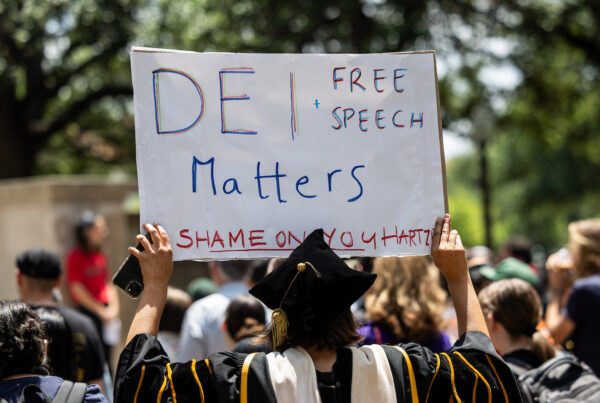From KERA News:
Seraphine Pecson knew she wanted to move away from her hometown in the suburbs of Houston when it was time to go to college in 2022.
She wasn’t out as trans to many people, including her parents.
“I was like, OK, high school sucks,” Pecson said. “I’m going to get through it. Once I’m in college, I’m free.”
Pecson hoped to feel more accepted at UT Arlington, named one of the top LGBTQ+-friendly colleges in the country. And for a while, she did.
“I remember part of my freshman orientation was them sitting us down in a room…talking to us about the different things that the LGBTQ+ program could do,” Pecson said. “I distinctly remember writing down the email that I would need to go to..change my name. I don’t know, it felt really hopeful.”
Throughout her freshman year, Pecson used the school’s LGBTQ+ resource center to get her name changed on her campus ID and for occasional counseling. Now an upcoming junior, Pecson was hoping the center could also provide guidance on starting hormone therapy last semester. But when she tried to reach out through the program’s website – the webpage was gone.
UTA had restructured the program to comply with Senate Bill 17, which bans university Diversity, Equity and Inclusion efforts. Under the new law, Texas universities and colleges had to end their DEI programs, including scaling back and, in some cases, shuttering resource centers that served LGBTQ+ students.
UTA administrators didn’t inform the program’s supervisor or student workers about its closure until the last minute.
Before SB 17 went into effect in January, the school’s LGBTQ+ program was a hub for students like Pecson. It offered a local wellness guide and a list of national resources, such as the Trans Lifeline and Transgender Law Center.
“The LGBTQ program was big. We held events all the time,” said Ryan Hoffman, who works as an on-campus advocate offering guidance to other LGBTQ+ students. “The fact that it’s gone, and they didn’t even tell anyone, was ridiculous.”
Earlier this year, UTA told KERA some services will now be offered through the newly created Intercultural Student Engagement Center. But Pecson said the services available can’t really help with the unique struggles that queer students may face.
“It’s terrible to see [SB 17] have such real and terrible impacts on our campuses,” she said.
Hoffman said advocates can still help students with ID name changes and counseling, but they can’t help with gender-affirming medical care. KERA reached out to UTA for more details about its LGBTQ+ resources, but a spokesperson said they can’t readily provide that information.
Elsie Kindall, a government affairs associate with Equality Texas, said this is happening at campuses all over the state. The University of North Texas canceled its Pride celebration earlier this year; UT Austin replaced its Gender and Sexuality Center with the Women’s Community Center and ended training on sexual orientation and gender identity.
Students are left to navigate things on their own that could help them be more themselves.
“Taking away things like that [can] be impactful and hurtful, especially [to] trans students,” Kindall said.

















